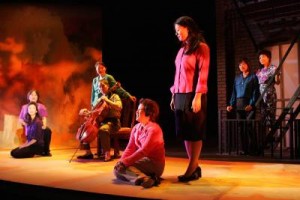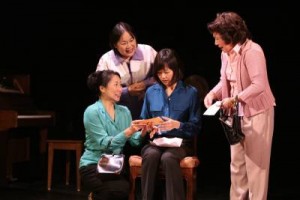
Fans of Amy Tan’s novel The Joy Luck Club or Wayne Wang’s 1993 film version will find much to relish in East West Players’ production of its stage adaptation by Susan Kim.
As readers or film buffs will recall, The Joy Luck Club explores the generation and culture gap between four middle-aged Chinese-born women and their San Francisco born and raised daughters.
Kim’s play features as narrator Jing-Mei aka June (Elaine Kao), whose mother Suyuan (Cici Lao) has recently died, leaving an empty space at the mahjong table where she and her three best friends have met over the decades as “The Joy Luck Club.”
Like the other three daughters in Tan’s tale, June has had “issues” with her traditional Chinese mother, whose ambitions for June have often been at odds with her Americanized daughter’s wishes. Take for example Suyuan’s insistence that pre-teen June become a pianist, only to have her daughter prove an embarrassment to her at her first (and last) recital. Now, June is considering a trip to China to meet the long lost daughters her mother had abandoned there decades before.
Waverly (Celeste Den) was a child chess prodigy whose mother Lindo (Karen Huie) used to parade her around San Francisco, the issue of Life Magazine which featured an article about Waverly always in hand. Now Waverly is trying to find a way to break it to her mother that she is planning on marrying Rich, a Caucasian with little sensitivity to cross-cultural differences.
Lena (Katherine Lee), the rebellious daughter of Ying-Ying (Deborah Png), finds herself unable to stand up to her successful (but penny-pinching) architect husband Harold, a man who has little interest in his wife’s likes and dislikes.
Finally, there is Rose (Jennifer Chang), daughter of An-Mei (Emily Kuroda), who witnessed her youngest brother Bing’s drowning as a child, and has recently learned that her husband plans to leave her for another woman, something which the unassertive Rose finds herself powerless to do anything about.
As in Tan’s novel, the mothers’ stories reveal four women whose daughters’ lives are no match in pain and tragedy for their mothers’ earlier lives in China.
Suyuan was forced by war to abandon her infant twins and spent the rest of her life trying unsuccessfully to locate them. An-Mei was raised by her grandmother and forbidden to talk to her mother, a wealthy merchant’s concubine. Lindo’s husband turned out to be an impotent mama’s boy and her mother-in-law an impossible, domineering woman. Only Ying-Ying’s tale of her encounter with a wish-granting Moon Lady seems tame by comparison.
Kim’s stage adaptation features a cast of eleven actors playing over thirty roles. In addition to the eight women, each of whom have multiple parts, there is the male trio of Edward Gunawan as the younger Chinese male characters, Ben Lin as the older ones, and David Stanbra as various Caucasian husbands and boyfriends.
Under Jon Lawrence Rivera’s imaginative, sensitive direction, the entire cast perform flawlessly, with special mention due the eight superb women who portray their characters at various ages, from childhood to middle-age.
John J. Binkley’s set design features a row of brownstones which sets the contemporary sections squarely in the present while Binkley’s projections on a several-yards-high Chinese scroll on the left of the stage reveal the name of the character whose story is being told as well as the title of each of the play’s chapters. Jeremy Pivnick has worked his usual wonders with lighting and Dori Quan’s costumes evoke the two cultures in which the women have lived their lives. Nathan Wang’s excellent sound design incorporates his original music, performed by cast members a la John Doyle’s Sweeney Todd.
Some may complain that Tan’s many tales are just too much for a two-hour stage adaptation, and even those who have seen the film or read the novel may find the multiple plots a bit hard to follow. Ultimately, though, it’s not so much the clarity of the plot lines that count so much as it is the overall impact of this epic tale, and never more so than when June finally takes her mother’s place among her aunties as a member of the Joy Luck Club. Four young women have learned important life lessons from their courageous mothers, and one cannot fail to be moved by their journey.
East West Players, David Henry Hwang Theatre, 120 Judge John Aiso St., Los Angeles.
www.eastwestplayers.org
–Steven Stanley
November 12, 2008
Photos: Michael Lamont




 Since 2007, Steven Stanley's StageSceneLA.com has spotlighted the best in Southern California theater via reviews, interviews, and its annual StageSceneLA Scenies.
Since 2007, Steven Stanley's StageSceneLA.com has spotlighted the best in Southern California theater via reviews, interviews, and its annual StageSceneLA Scenies.







 COPYRIGHT 2024 STEVEN STANLEY :: DESIGN BY
COPYRIGHT 2024 STEVEN STANLEY :: DESIGN BY